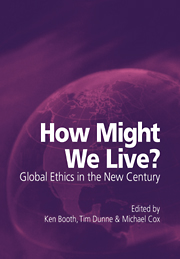Book contents
- Frontmatter
- Contents
- Notes on Contributors
- Acknowledgements
- Foreword
- Introduction: How Might We Live? Global Ethics in a New Century
- Individualism and the Concept of Gaia
- Bounded and Cosmopolitan Justice
- Globalization From Above: Actualizing The Ideal Through Law
- A More Perfect Union? The Liberal Peace and the Challenge of Globalization
- International Pluralism and the Rule of Law
- Towards a Feminist International Ethics
- Contested Globalization: The Changing Context and Normative Challenges
- Universalism and Difference in Discourses of Race
- Does Cosmopolitan Thinking Have a Future?
- Individuals, Communities and Human Rights
- Thinking About Civilizations
- Index
Does Cosmopolitan Thinking Have a Future?
Published online by Cambridge University Press: 04 August 2010
- Frontmatter
- Contents
- Notes on Contributors
- Acknowledgements
- Foreword
- Introduction: How Might We Live? Global Ethics in a New Century
- Individualism and the Concept of Gaia
- Bounded and Cosmopolitan Justice
- Globalization From Above: Actualizing The Ideal Through Law
- A More Perfect Union? The Liberal Peace and the Challenge of Globalization
- International Pluralism and the Rule of Law
- Towards a Feminist International Ethics
- Contested Globalization: The Changing Context and Normative Challenges
- Universalism and Difference in Discourses of Race
- Does Cosmopolitan Thinking Have a Future?
- Individuals, Communities and Human Rights
- Thinking About Civilizations
- Index
Summary
It certainly has a past. And that past, especially in its Stoic foundations, reveals a clear ethical purpose: ‘As long as I remember that I am part of such a whole [Universe],’ explained Marcus Aurelius, ‘… I shall … direct every impulse of mine to the common interest’. Moreover, the word ‘cosmopolitan’ derives from kosmopolites, citizen of the universe, and polites, citizen, notably in its Aristotelean definition, has a decided ethical content. Accordingly, if the citizen of a state (polis) should be possessed of civic virtue (arete), by extension, the citizen of the universe (kosmopolis) should live a life of virtue, guided by his perception and understanding of the divine, natural law. True, in non-academic parlance the word ‘cosmopolitan’ has, from the eighteenth century, acquired the vague and vulgar connotation for an individual of enjoying comfortable familiarity with a variety of geographical and cultural environments. None the less, the more precise, political–ethical sense of a kosmopolites is so much more apposite to our present purpose that this essay will be framed in the main by this meaning.
With the question thus interpreted, it follows that we wish to know whether state citizenship, as we currently understand it, might be paralleled by a world citizenship of comparable content; if so, we obviously also wish to know what the implications must be for the individual's moral and political behaviour and the institutional contexts which would be needed to facilitate this cosmopolitan behaviour.
- Type
- Chapter
- Information
- How Might We Live? Global Ethics in the New Century , pp. 179 - 198Publisher: Cambridge University PressPrint publication year: 2001
- 1
- Cited by



